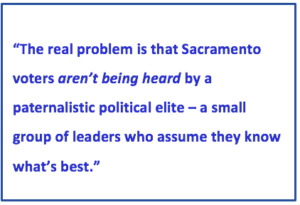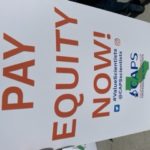Dan Walters November 9 column in the Sacramento Bee recycled timeworn arguments in defense of Measure A, the City of Sacramento’s “strong mayor” proposal defeated on November 3.
Sacramento, he wrote, is like a “gangly adolescent” not “willing to grow up,” not mature enough to adopt “a big city governance structure.”
Really? I see it differently: One of the state’s most politically sophisticated communities – more policy wonks per precinct than most municipalities – resoundingly rejected a flawed proposal that doesn’t fit t heir values and vision for Sacramento.
heir values and vision for Sacramento.
It’s not that Sacramentans don’t “get it,” that they’re not able to understand what civic sophistication really means.
Quite the opposite. The real problem is that Sacramento voters aren’t being heard by a paternalistic political elite – a small group of leaders who assume they know what’s best.
The “strong mayor” proposal was poorly timed and marketed with brash manipulation.
For many of us involved in City politics (but not part of the Mayor’s inner circle), Measure A came out of nowhere, and was strong-armed through City Council in a matter of weeks.
There were no neighborhood-based, public hearings and scant opportunity to vet a complicated proposal that would have fundamentally restructured city government.
At the two Council meetings where Measure A was deliberated, dozens of community leaders implored Councilmembers not to push forward with a city charter amendment right before “the election of our lifetimes” and in the middle of a pandemic, when people are struggling to find or keep jobs, pay rent, and quite literally, stay alive.
The appeals made no difference: Business support was already lined up, and Mayor Steinberg, Measure A’s most visible advocate, moved ahead and spent over a million dollars to promote Measure A.
You read that right: over a million dollars.
Continue reading “Sacramento Voters Don’t Think Father Knows Best”
 With a budget surplus nearing $100 billion, it’s time for Governor Newsom and the California State Legislature to address demands for pay equity from state scientists whose work is undervalued and underpaid.
With a budget surplus nearing $100 billion, it’s time for Governor Newsom and the California State Legislature to address demands for pay equity from state scientists whose work is undervalued and underpaid.


